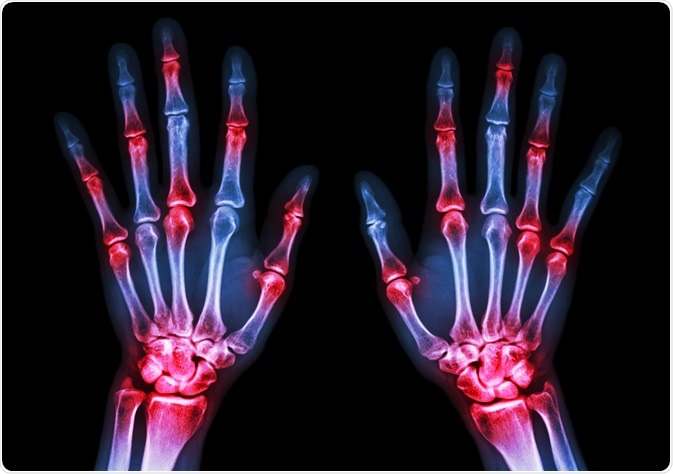Rheumatoid arthritis (RA) is an autoimmune disorder that causes inflammation of the joints. RA is a chronic and progressive condition that causes debilitating effects on the patient. The condition is characterized by pain and stiff joints.
 Image Credit: Puwadol Jaturawutthichai / Shutterstock.com
Image Credit: Puwadol Jaturawutthichai / Shutterstock.com
Another typical feature of this disorder is bone and joint destruction and the presence of autoantibodies in the serum and synovial fluid. Synovial fluid is the fluid that lubricates the synovial joints.
What causes rheumatoid arthritis?
The exact mechanism by which patients develop RA is unknown; however, a combination of genetic and environmental factors is likely. Autoimmune antibody production is proposed to be the main mechanism responsible for bone and joint destruction, and the related RA pathology. Infections, hormonal alterations, and stress are some potential triggers of RA.
Recent research suggests an association between antibiotic use, gut microbiota changes, and RA flares.
Antibiotics and the gut microbiota
Antibiotics are widely used for the treatment of bacterial infections associated with the respiratory system, gastrointestinal system, and urinary tract. Although antibiotics act against pathogenic bacteria, they can also modify the normal gut microbiota.
The gut microbiota is a diverse system of microorganisms residing in the gastrointestinal tract of the human body. Gut microbiota plays a vital role in maintaining the body’s digestive health. Gut microbiota is also involved in the immune system and the synthesis of vitamin B and vitamin K.
Various epidemiological studies have demonstrated associations between the occurrence of bacterial infections and RA. Furthermore, microbiome alterations have been indicated as a potential mechanism for the effect of infection in RA pathogenesis. Antibiotics substantially disturb the gut microbiome, with studies demonstrating significant microbial shifts in the gastrointestinal tract following their use.
The alterations in the gut microbiome may last up to a year after treatment periods of only one week. As per a recent study by Nagra et al., the risk of RA flare was significantly increased in the 1–12 months after commencing treatment on sulphonamide and trimethoprim antibiotics.
Antibiotic usage and the risk of rheumatoid arthritis
Emerging research suggests that infections are potential risk factors for RA pathogenesis and flares. Respiratory infections have been particularly linked with the development of RA. Antibodies to citrullinated peptide antigens (ACPA) are one of the autoantibodies associated with RA.
ACPAs have been found to be produced in response to certain bacterial components, which suggests the potential role of infections in RA pathogenesis. As per a population-based study published in 2019, respiratory tract pathogens such as Chlamydia pneumoniae are associated with elevated circulating autoimmune antibodies.
The study analysis found that the strongest association of infections and RA was identified only in subjects treated with an antibiotic and not in untreated subjects. These findings suggest that antibiotic use may be the probable reason for the increased occurrence of RA.
As per the authors of the study, “Individuals exposed to one or more antibiotic prescriptions were 60% more likely to develop RA than their unexposed counterparts”.
Concluding remarks
Although several studies have described the potential role of antibiotic use on the microbiome, which is potentially disrupted in RA, further research is required to explore the exact mechanism responsible for the same.
Sources
- Sultan, A. A., Mallen, C., Muller, S., Hider, S., Scott, I., Helliwell, T., & Hall, L. J. (2019). Antibiotic use and the risk of rheumatoid arthritis: a population-based case-control study. BMC medicine, 17(1), 154. doi:10.1186/s12916-019-1394-6
- Nagra, N. S., Robinson, D. E., Douglas, I., Delmestri, A., Dakin, S. G., Snelling, S., … Prieto-Alhambra, D. (2019). Antibiotic treatment and flares of rheumatoid arthritis: a self-controlled case series study analysis using CPRD GOLD. Scientific reports, 9(1), 8941. doi:10.1038/s41598-019-45435-1
- Yoshii, K., Hosomi, K., Sawane, K., & Kunisawa, J. (2019). Metabolism of Dietary and Microbial Vitamin B Family in the Regulation of Host Immunity. Frontiers in nutrition, 6, 48. doi:10.3389/fnut.2019.00048
Further Reading